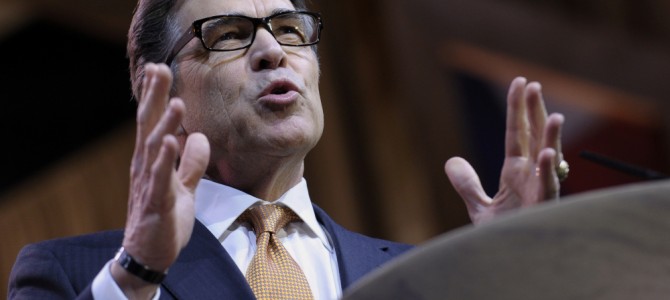
So I have a question for all the people who said they were sick, sick, sick of the inside-the-Beltway, Washington, DC, Republican establishment, and they wanted Donald Trump to smash it to pieces. Did you think the first person you would take down in your fury would be…Rick Perry?
Because that’s what just happened.
No sooner did I urge Rick Perry to hang on until voters had a chance to rediscover him than he dropped out of the race. He had gotten lost in a big field of candidates and dropped to 1% in the polls, and his campaign was running out of money.
(This reminds me of the last presidential cycle, by the way. Every time I said I liked a candidate—including Rick Perry the first time around—he would flame out spectacularly. So I guess I’d better keep my mouth shut about Carly Fiorina, even when she does great stuff like this.)
Make no mistake, it was Trump who finished off Perry’s campaign. The polls show that Trump’s entry into the race hit different candidates differently. For the most part, it didn’t crush Jeb Bush, the man regarded as the establishment candidate. It crushed other anti-establishment candidates: better, more consistent, more serious anti-establishment candidates. Trump siphoned off nearly half of the supporters from both Rick Perry and Ted Cruz and helped knock Perry out of the first prime-time debate, sending him to be ignored at the “kids’ table.”
Being the hardest hit, Perry and Cruz have taken opposite approaches to the Trump threat. Perry sharply criticized Trump, while Cruz has sidled up to him in the hope of capturing his supporters (or recapturing them) when he drops out. It’s somewhat depressing that the first person out of the race is the only one who really chose to stand up to Trump. It’s depressing because Trump really deserves to be criticized, and it’s depressing because no candidate ought to be given a free pass through the gauntlet of the primaries.
Obviously, it is a candidate’s job to marshal his own support, so Perry’s failure to achieve takeoff is not entirely Trump’s fault. But Trump’s strategy of dominating all of the media over the summer has made it much more difficult for those on the long roster of Republican hopefuls to get any notice or to move their campaigns forward in any way.
More to the point, Perry is a victim of Trumpism.
By any measure of the conservative agenda—particularly low taxes, light regulation, and strong national defense—Perry was a solid candidate, and as governor of Texas, he has hardly spent his career sequestered inside the DC Beltway. Perhaps in the eyes of the single-issue anti-immigration fanatics, who credulously believe that Donald Trump is really going to deport 11 million people and build a giant wall across the whole border, anything less than these extravagant promises doesn’t impress them. But not all of Trump’s support comes from these single-issue voters, and Perry has certainly managed to handle the immigration issue well enough to satisfy voters in a very right-leaning border state.
But the problem is that Rick Perry has spent the years since his last presidential campaign establishing himself as a thoughtful conservative. He tried to set himself up for this run by giving interesting speeches with a fresh message on serious issues like poverty and national security. But in the year when the Trumpenproles deride people who think, he was a man out of step with the times. Perry was the guy who had studied and mastered the details of policy, in a year when it’s becoming a running joke that the front-runner offers no policy details whatsoever.
In short, Rick Perry was the thoughtful adult—down to the horn-rimmed glasses—in the year when a whole section of the conservative “base” decided what it wanted was a loud, thrashing temper tantrum.
If you want a sense for what we just lost, read Perry’s farewell speech. The whole thing is a tribute to American values and an eloquent indictment of the current president. But it’s a lot more than just bombast, particularly in his two warnings to Republican voters.
[T]he answer to a president nominated for soaring rhetoric and no record is not to nominate a candidate whose rhetoric speaks louder than his record. It is not to replicate the Democrat model of selecting a president, falling for the cult of personality over durable life qualities….
My second warning is this: we cannot indulge nativist appeals that divide the nation further. The answer to our current divider-in-chief is not to elect a Republican divider-in-chief…. In an America blind to color, that champions the individual, that recognizes merit, there is no room for debate that denigrates certain people based on their heritage or origin. We can secure the border and reform our immigration system without inflammatory rhetoric, without base appeals that divide us based on race, culture and creed.
Perry may be leaving the race, but he leaves looking like a man of dignity, character, principles, and “durable life qualities.” Which, alas, is exactly what we needed in the race right now.
The only hope is that a lot of people watching Rick Perry go will decide that they didn’t realize how much they missed these things until they saw them slipping away.
Follow Robert on Twitter.









